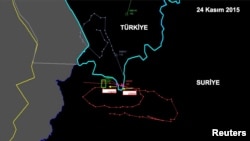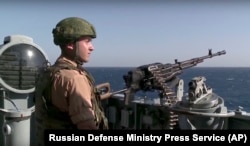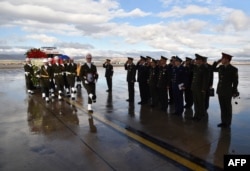A week after Turkey shot down a Russian fighter jet, U.S. President Barack Obama is calling for a de-escalation of tensions between the two countries and a unified front on the Syrian conflict.
"We all have a common enemy and that is ISIL. And I want to make sure we focus on that threat. And I want to make sure we remain focused on the need to bring about some sort of political resolution in Syria," said Obama.
The U.S. president spoke Tuesday following talks with his Turkish counterpart Recip Tayyip Erdogan on the sidelines of the U.N. climate conference. The meeting took place a week after Turkey shot down an SU-24 fighter jet, saying the Russian aircraft had entered its airspace.
Russia has insisted the jet did not cross the Turkish border and responded by imposing economic sanctions against Ankara.
Obama reiterated support for the U.S. ally.
"The United States supports Turkey's rights to defend itself, its airspace and its territory. And we are very much committed to Turkey's security and its sovereignty," he said.
Turkish President Erdogan called for diplomatic language to resolve what he called problems in the region.
"We don't want to invest in tensions, we want to avoid the tensions. We don't want to get hurt and we don't want anyone to get hurt, because if tensions arise in the region, all of the parties involved get damaged at the end. We want peace to prevail at all costs," said Erdogan.
Obama praised Turkey's "generous" support of refugees and said the United States is interested in accelerating the military-to-military relationship to ensure "Turkey is safe and secure, but also that Syria can finally begin winding down what has been a terribly costly war."
Russia's focus on Syria
On Monday, Obama met with his Russian counterpart Vladimir Putin to discuss the situation in Syria, where he again called on Putin to focus its efforts on Islamic State militants instead of the Syrian moderate opposition.
When asked during a news conference Tuesday whether the United States has seen a recent shift in Russia’s focus, Obama remained cautious.
“I don’t expect that you’re going to see a 180-turn on their strategy over the next several weeks. They have invested for years now in keeping [Syrian President Bashar-al-] Assad in power. Their presence there is predicated on propping him up. And so that’s going to take some time for them to change how they think about the issue,” said the U.S. president.
Obama noted the world should not be under the illusion Russia will begin hitting only Islamic State targets.
“That’s not happening now. It was never happening. It’s not going to be happening in the next several weeks,” he told reporters before departing Paris for Washington.
Obama said despite U.S.-Russia differences on Syrian President Assad remaining in power, Moscow’s involvement in the Vienna process was an “indication Mr. Putin recognizes there is not going to be a military resolution to the situation in Syria.”
In the fight against Islamic State, the U.S. president said Turkey has made progress in sealing its border with Syria, but that gaps remain.
“In particular, there’s about 98 kilometers that are still used as a transit point for foreign fighters, ISIL shipping out fuel for sale that helps finance their terrorist activities,” Obama said.
Turkey, Russia tensions
A day before, in his meeting with Putin, Obama expressed regret over the loss of a Russian pilot and crew member in Turkey’s downing of a fighter jet and the subsequent rescue effort. He urged the Kremlin leader to reduce tensions with Turkey over the November 24 incident.
Putin on Monday refused to meet with Erdogan on the sidelines of the climate conference and accused Turkey of shooting down the Russian jet to protect oil supplies he said Turkey received from the Islamic State militant group.
Erdogan vehemently rejected the assertion, saying he would resign if Putin's allegations were proven. The Turkish leader also said Monday he would not apologize for the incident.
In Ankara, Turkish Prime Minister Ahmet Davutoglu said Tuesday it is "not possible to conceal air space violations through baseless accusations targeting Turkey like [allegations of] oil purchases from Daesh." Davutoglu also called on Russia to keep diplomatic channels for dialogue with Turkey open.







